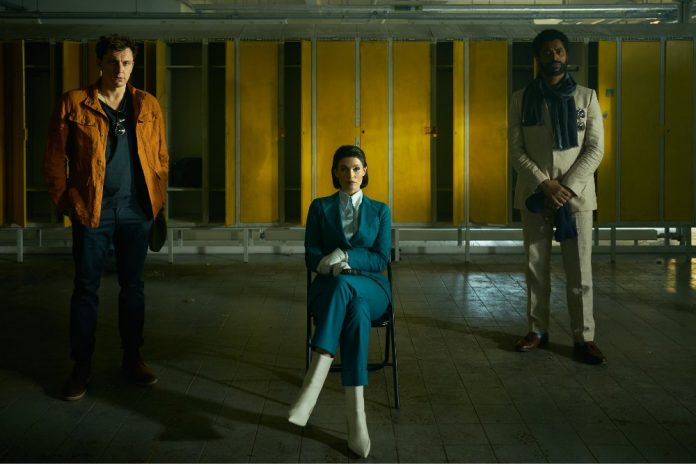From a young age, J. Blakeson (The Disappearance of Alice Creed, I Care a Lot, Gunpowder) can still remember his love of going to the cinema and the feeling of escaping into another world. It’s that memory and wanting to be an actor — albeit never completing that dream to fruition — that inspired him to become a director, screenwriter, and ultimately a producer. It’s also his respect for actors who can take his words and bring them to a life he could never have anticipated. Experience with all three disciplines can be seen on the screen in the upcoming crime-thriller series Culprits from Disney+ and Hulu, where Blakeson has left his distinctive mark as showrunner, writer, and director.
Based on the anthology book series “Culprits,” J. Blakeson created the eight-episode series in his own voice, which involves a heist whose crew is being targeted by masked killers seeking some kind of vengeance. Shot in several countries around the world and justaposing between “Now” and “Then,” with character names such as “Muscle,” “Officer,” “Devil,” “Soldier,” “”Right and,” “Fuse,” and “Brain,” you know you’re in for a unique episodic experience.
Above The Line spoke with J. Blakeson from his home office in London, where he was surrounded by vinyl. No surprise since one of his favorite duties as showrunner is to work with the music supervisor, choosing the eclectic soundtrack that illustrates the international journey of the characters. Blakeson, who likes to refer to his favorite moments as “the best bits,” discusses his delight in location scouting and going to places that are off limits to the public. Setting the action in seven different countries, he revealed the doppelganger countries that stepped in for France and America.
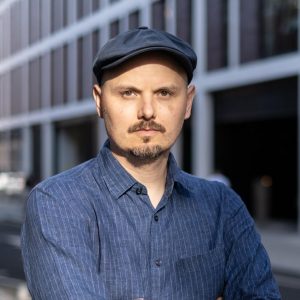
Above The Line: It’s so nice to meet you. What was the inspiration for this series?
Blakeson: I worked with Stephen Garrett, the executive producer, on a film that never got made seven years ago. We’d always got along, and we’d always wanted to work together again. About six years ago, I think, we went for a cup of tea, and he told me that he’d bought the rights to an anthology book called Culprits. He told me about the basic concept of it, which sounded intriguing. So he sent me a two-page summary of it after the meeting. I read that and immediately thought there was something really interesting in the concept of it.
ATL: How is the book different from your writing of the series?
Blakeson: The concept of the book is similar to the concept of the show, which is that a group of people have done a crime, a robbery, in the past, but now that we meet them, they’re all spread across the world. The book’s individual short stories are written by different writers. They’re just imagining a character and how they would survive out in the world. But I just like the idea of that question: What would you do if you had a big bag of money? If you could go anywhere and be anyone you wanted, where would you go? What would you do? Who would you be?
ATL: What did you find as the answer to that question that made the piece your own?
Blakeson: I thought the way that people make that decision really says a lot about them — about who they want to be, who they are, and who they think they are. Your reaction to it as a viewer says a lot about how you feel about these people. It’s good to have a big what-if, you know what I mean? It’s the thing that you can ask your friends, “What would you do? Where would you go?” A lot of people go immediately to luxury and yachts, drinking champagne. Whereas, actually, if you think about it, even if you had a lot of money, you’d have to launder that money. There are a lot of problems involved with it. Cash is difficult to spend these days, especially over here, where there’s no cash being spent anymore. Everything’s on plastic. I had lots of these questions that you could answer. So I was alreadyspinning lots of ideas and had ideas for different characters based on that. I started talking to Stephen about that, and so we immediately started spinning away from the book and making our own thing based on that concept.
ATL: Talk about the actual styling of this, which juxtaposes in time between “Now” and “Then,” in different locations.
Blakeson: The idea of bouncing around was just to tell the story in the most mysterious way, because there’s lots of secrets from the viewer. You’re thrown in, and you don’t know what’s happening. It’s not like we meet [Joe] (Nathan Stewart-Jarrett) and then he’s invited into this crime, and then he does the crime and he runs away. You’re thrown into his new life, in such a way that you empathize with him because it’s a very familiar life. It’s a life that a lot of us and our families lead, like dropping kids off at school, having to do boring paperwork, going to boring meetings, having little microaggressions from people who don’t like you for some reason, having kind of passive aggressive conversations with your partner, things like that. That feels kind of very normal, and then you engage with him, and you kind of get this instinctive feeling that he’s a good guy, a nice guy, and he’s trying to live a good life. But then, when you get shown who he was before, that muddies those waters. made complicated, and I really like the idea of that.
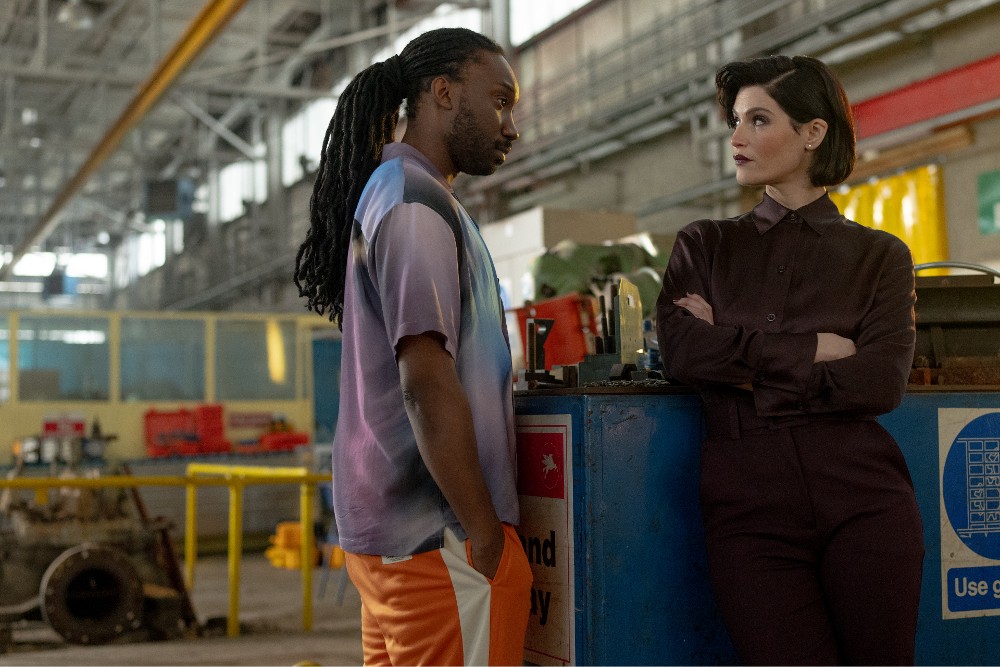
ATL: Not to give too much away, but Nathan Stewart-Jarrett has to use an English and American accent throughout the series. Did it ever get confusing?
Blakeson: I don’t think we got confused. I have it all in my head, so I know where we are at any point, and then we have a great script supervisor who also knows exactly where we are. If anybody gets confused, it did sometimes mean that you had to make decisions that you hadn’t thought about because you were suddenly like, “Oh, he’s answering the phone. Is that meant to be in an English accent or an American accent?” Sometimes we do it both ways. Then we shot all the American stuff first. So he was actually more in the American accent than he was in the English accent. In fact, the kids never heard him do his English accent. He was always in an American accent, so Maria Nash, who plays Frankie, once heard Nathan talking to me in his English accent. She was shocked! [laughs] Which was really funny, but we were like, don’t tell, don’t tell Bae; he played her little brother because we wanted Bae to just be lost in the reality of the moment rather than be thinking, “Oh, this is an English guy in an American accent.”
ATL: As I was watching this, I couldn’t help but think of Mr. And Mrs. Smith. Were you influenced by that film at all?
Blakeson: No, I wasn’t. That’s the first time anyone’s mentioned that. I think I’ve seen that film once, when it came out. Maybe because they’re secret agents in hiding, but no, I just like the idea of this man, who didn’t really know who he was or who he wanted to be. He knew he wasn’t happy being the person he was in London and wanted to live a different life. Then just how complicated would it be to have to lie to everybody you love? So you feel like this is the real you, even though you’ve got a fake accent, you’ve got a fake passport, and you’re telling lies to everybody you love. Even though you’re doing all that, you think, well, this is the true me. There’s something interesting having to do with identity. On a very basic level, the idea is that when you change schools, go to college, or move to a new city, you have this opportunity, even if you don’t have a big bag of money, to change your name to slightly modify how people see you because all of those expectations that people at school have had of you or the expectations of people from your past, you can throw them away and you can reinvent yourself as a slightly different version. It might be a version that you regret doing. Imagine if you do a slightly different accent, for example, and then you’ve got to keep that up. It’s all those sorts of things that were influencing me.
ATL: Interesting. As a director, why did you decide to direct the first couple of episodes and then the last episode?
Blakeson: Physically, I just couldn’t direct all eight of them, and it’d be across all the writing and showrunning as well. If I was just directing, I could possibly have done it. But we were double-banking quite a lot, so we had both directors, me and Claire Oakley, working at the same time with different cast members and different sets, or it would have just taken another six months to shoot, which we didn’t have the budget for. It’s also really nice, and it’s the first time I’ve done it, to work with another director. I mean, normally when you’re on a film, you’re the only person in your department, whereas in this case, I had somebody else in my department, and it was a filmmaker I was really excited about. Claire’s feature film, Make Up, is amazing. I really, really love that film. It’s very different from this. It’s got no stunt or action in it or anything, but she’s got a great eye, and she’s got a great thing for tone, atmosphere, mood, performance, and storytelling. And she got that thing of mystery and weeding out information. So she would go off and do hers, and then I could be really excited to see what she was doing. I mean, there’s another level of excitement in seeing how somebody else interprets the material. You don’t want to be doing karaoke with the lead director. You want to be able to express the things that you feel and bring something to the screen that you’re proud of, and I think Claire did that.
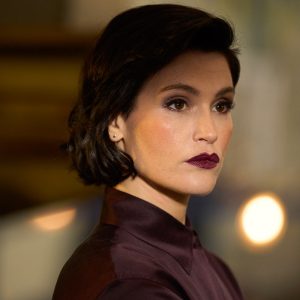
ATL: I love that you’re championing women in this with a female director and Gemma Arterton is playing the orchestrator, if you will, of the heist. Also, her makeup is off the charts.
Blakeson: I like a heightened look and even like Joe’s look, especially in the past, when he’s his old self and his look is quite heightened, and all the looks in the heist are heightened with the masks that we’re using. His hair, everybody’s hair, Gemma’s hair, Kirby’s [officer] hair—we didn’t make life easy for ourselves. [laughs] I worked with a brilliant hair and makeup person called Jackie Fowler, who I worked with before on a show called Gunpowder, and she is just absolutely fastidious about how the hair has to reflect the character and the scene. The way that we use color and the way that we use light, shade, and symmetry in this, everything had to fit together in each department. The look is quite colorful for a crime show. It has a slightly hyper-real look, and this gives you a little bit of leeway to make Gemma always in monochrome and always looking fabulous, even though it’s probably not totally realistic. I really love iconic cinema like David Lynch, and sometimes it’s just the power of an image or the power of a costume that pops off the screen that can really set a tone and set a character when you don’t have enough time to really live with that character.
ATL: What was it like reuniting with Gemma?
Blakeson: In my first film, The Disappearance of Alice Creed, she plays a kidnapping victim, so she’s completely powerless in that whole film. Up until the point of most of that experience, she was screaming and shouting and scheming to escape. Whereas in this one, she holds all the power, commands the room, commands the screen, and is totally in control. It was really lovely to work with her again after all this time, because we’ve been wanting to work together since Alice Creed. So to give her a totally different role, but where she absolutely gets to be in charge of everything, was really nice.
ATL: You mentioned Gunpowder which had amazing stunts. The stunts and the fight scenes in this are unbelievable. Did you work with the same stunt coordinator?
Blakeson: Oh, thank you. It’s just hard work. It’s hard work for the actors. We have a tough schedule, so they have to do it on their weekends, mornings, and afternoons, all in their free time. You know, Nathan bulked up a bit because his character’s called “Muscle” at certain points. So he was on this training regimen, this diet, and doing all the stunt training, and Niamh Algar [Specialist] was doing all the stunt training for all of her scenes, which were quite involved, and doing weapons training. We had a few stunt coordinators, but the main one was Julian Spencer, who had worked on Gunpowder as well. He likes to make fights messy but understandable so you can shoot them in such a way that you always understand what’s going on, but they don’t feel like it’s just people counting through the motions like it’s choreographed. He likes to keep it a little bit more wild, which looks great on screen. Then the editors have to cut it together, and that’s a whole other challenge because I like to shoot a lot of footage. So they get a lot of footage, and sometimes we’re slightly adapting in the middle. It’s different every time. It’s morphed as we were going. Now we have to make sense of it. (laughs) But we had a team of exceptionally good editors. They had to keep this pace going as well as keep the story understandable, and they did a great job.
ATL: I see you’ve got a lot of vinyl behind you. The music in this series is very culturally specific.
Blakeson: As you can see, I’m a bit of a music buff. I had a lot of music I brought to it, but there’s specific things that I would give a brief to Ian Neil, our music supervisor. There’s an introduction of a young teenager character, so we really wanted to find some female Arabic hip-hop that would suit her character and the scene. For something as brief as that specific, you get a very narrow field of stuff, so we were all doing a lot of research and trying to find things that were interesting. That adds another flavor to the mix because you instantly get her character and instantly get a change of feel because she’s entered the show. Ian and his team did a really good job of finding some good stuff. I really enjoyed doing the music at the very end. Marc Canham, who did the music, also did the music for I Care a Lot in my last film and for The Disappearance of Alice Creed, so we’ve got a really good working relationship. There is a lot of music on this; it’s very hard work and very intense. The show has this very specific tone and specific look, and the music just helps give it its own identity, not just trying to make it feel like some other show you’ve seen or aping other things. It really gives it its own distinctive flavor, which is what I really wanted.
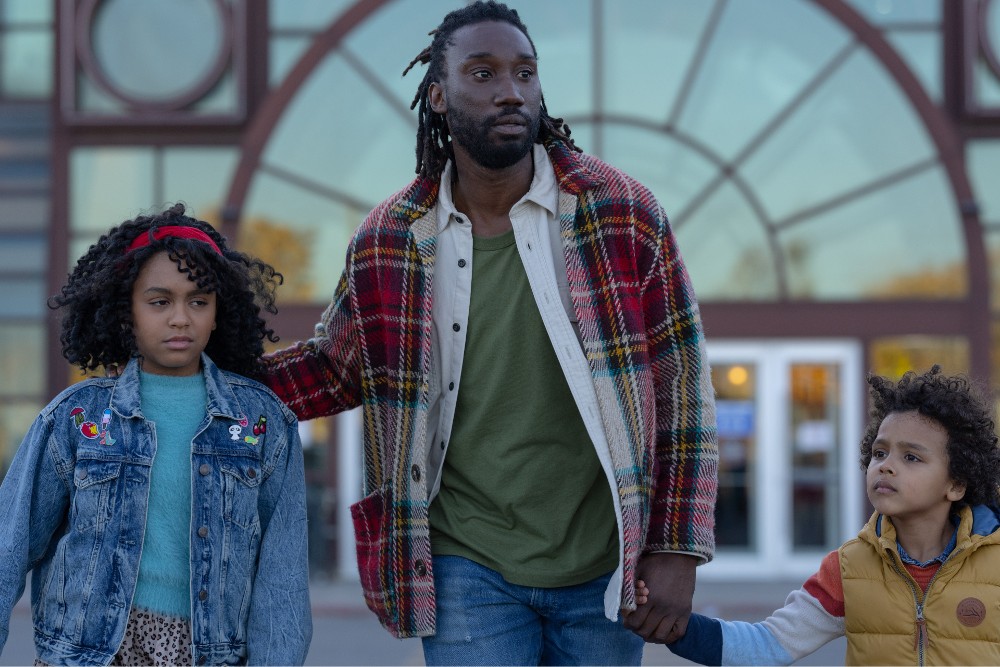
ATL: In the eight episodes that you shot, each feels like a movie unto itself.
Blakeson: Yeah, it was like making movies overall, back to back, which was tough. But the whole idea was — I mean, everybody always says this about miniseries [that] it’s like an eight-hour movie. But for this one, we very deliberately shaped it like a three-act structure. We knew we’d end it; the final episode is just putting everything to bed and opening up for the next one. Basically, the last 10 minutes can be the close of the story, like the end of the film. So the first three episodes feel like Act One, the second three episodes feel like Act Two, and the last two episodes are Act Three. And because we were doing it like that, we could then plan shapes within each episode. So it always feels like it’s going somewhere. Because we’ve got no central location, it’s not like we keep on cutting back to the same office where people are talking on phones. We’re not going to Central Park and having conversations. We go through locations and then leave them, and then often we never go back.
ATL: Let’s talk about the locations, and what went into choosing them.
Blakeson: It was a 75-percent location show. We found lots and lots of locations. We’re moving through them so quickly. I think that gives it the feel of being cinematic because it doesn’t feel enclosed. It feels like it keeps on opening up. The first three episodes were mostly shot in Canada, but for America. The whole show’s shot in seven different countries, and we shot in four countries. We were constantly moving around, constantly using locations, and never returning to locations. I think that makes each one of them feel like its own distinct thing because we never go backwards. It’s just constantly moving forward. I mean, obviously there’s going to be some people who recognize their streets and go; that’s not France. For example, the opening is in Lombardy, Italy, but we shot that just outside Barcelona. So we shot in Spain, and there’s some stuff set in Barcelona, so we shoot it for itself, but then there’s stuff set in the south of France, which is very similar looking to the north of Spain, so there’s a whole lot in there. We shot Canada for Canada, so that worked, and the UK is playing itself. Then we went to Norway for Norway. So the only doppelgangers really are for America; that one scene at the beginning in Italy and a bit of France- everywhere else is basically playing itself or a version of itself. There’s little bits where we’re shooting in London, we go around the corner, and then we’re in Manchester in the north of England, and then we go back around the corner, and we’re back in London.
ATL: What were some of the locations that were a challenge to find?
Blakeson: The heist takes place around this big building, and we could not find that in London, so we went to Manchester to find a building that worked for us, and we shot there for a week. It’s an old, empty factory. It’s part of the old industrial area in Manchester, so it’s surrounded by offices now, but that one just happened to be empty. A lot of places shoot there. It’s often used in New York because it’s like red brick buildings, fire escapes, and alleyways. So if you ever see a UK show that’s got a lot of people walking around the back streets of New York, especially period 1920s New York, it’s probably that street. [laughs] It’s a very popular location on the street because it looks amazing. Sometimes I don’t like when you see a film and you recognize all the locations because you’ve shot at them before. I wish they’d find me something new that’s never been shot or that’s never been seen, but there’s a reason that people use the same places over and over and over again. It’s just because they look good on camera, so why go shoot somewhere that looks ugly if you can shoot somewhere that looks pretty?
ATL: I get the feeling that you enjoy location scouting.
Blakeson: I really love location hunting because you get to go through the doors that say “no entry” all over London. So you get to go on the tracks in the London underground, or you get to go behind the scenes of the Tate Gallery and see where all the art is stored, where all the back stairs are, and all the things you don’t normally get to see through all the doors that you’re not allowed to go through if you’re just a member of the public. You can go and poke around and see the hidden side of a city wherever you’re going, and that’s really fun.
ATL: What are your other favorite jobs to do as a showrunner?
Blakeson: I like working with actors. That’s my favorite thing. I really love working with the visuals of it, working with production designer, with my Cinematographer Philipp Blaubach, who I’ve worked with before. By the time we get on set, we’ve been making lots of decisions and we know what we want. But all of this prep, everything we do before we get to the shoot is all just for 90 seconds with these two people who’ve been sitting in their trailer for two hours waiting for us to be ready to call them. Then they come and we say, “Look, you’ve got 90 seconds, go, be amazing. Make me feel something.” There’s such pressure, and I’m in awe of great actors because you sit by a monitor, and I know what’s going to happen. I’ve written all the words they’re going to say, but sometimes it’s amazing what actors can do with the material.That for me is the biggest joy because I lose myself. I love going to the cinema because I like to forget who I am for two hours. I love sitting there and being sucked into another world. If that can happen on set with all the stress going on; you’ll just look at this monitor and you’re heart’s in your mouth. That’s the best bit.
ATL: Were there times when dialogue changed because the actor did it a little bit differently than it was written and you liked it better?
Blakeson: Sometimes they throw things in. I normally talk to my actors before and say, most of the time, “I would like you to do it exactly as written, because I’ve got a very specific kind of rhythm to my writing,” which isn’t particularly realistic, and a lot of the “ums” and the pauses are all written in the script. A lot of my screenwriting heroes are very dialogue-centered, like Billy Wilder or Aaron Sorkin, those kinds of guys who’ve got very smart dialogue. I looked up to them when I was coming up. What we first do when we get together with the actors is just run it, and if we run it and it’s not quite working, they say, “I don’t need to say that. I can do that with a look.” I just say yes to it. You have this push and pull. When it’s up in front of the camera, they’ll save something, and they’ll surprise you. They’ll go off-book, and they’ll do something, and then sometimes it’s amazing. They know these characters better than I do because they spend 24 hours a day thinking about them when they’re shooting. That’s all they care about. That’s what I love about good actors—that they’ll just make everything better. You know you try and make it really good on the page, and then you work with all these great heads of departments, you work with great actors, and they just make the whole thing like it’s its own thing. It has a life of its own.
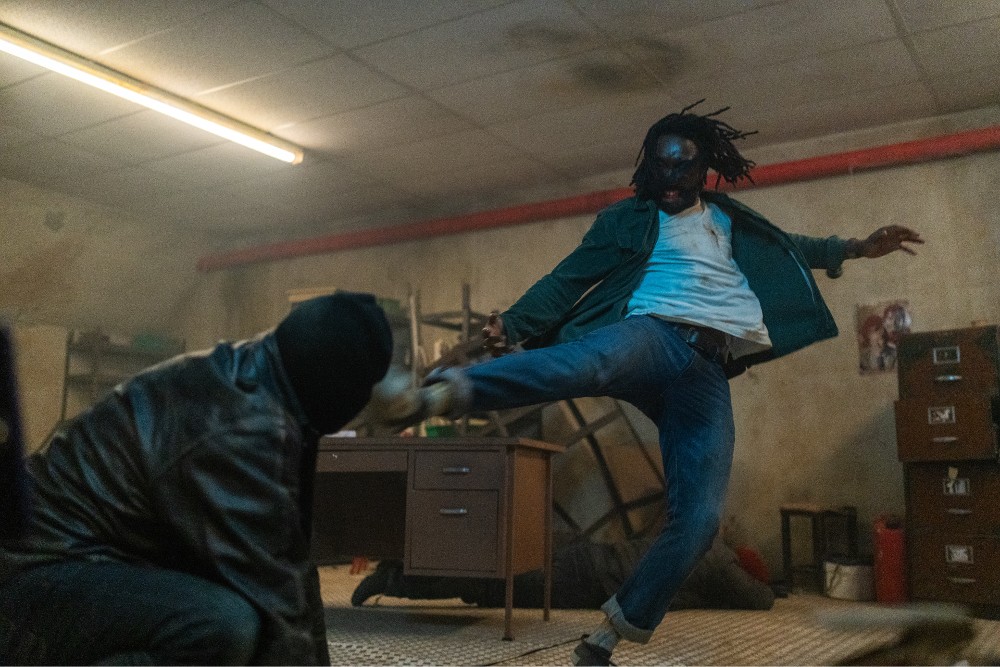
ATL: When you look back on your own humble beginnings, did you ever want to be an actor?
Blakeson: [laughs] In my humble beginnings, I wanted to be an actor. I started off wanting to act. I used to do local theater and things like that. I was forced to act in my short films when I was 13, 14, and 15. And I quickly realized, a bit like somebody who plays sports, that I wasn’t as good as some of the other people. I thought about it a lot. I loved it, and I watched people who were good at it, but I was in my head too much. I just couldn’t do that thing actors do, where they just do it without thinking about it. I think you can tell I’m in my head too much just by talking to me. [laughs] That’s why it’s good to be a writer or a director, because you’re constantly analyzing and thinking. I find it very hard to leave that behind and then act. In theater, I’d be listening to how the director worked with people and talking to the other actors who were really good. I guess the short answer is that when I was in theater, there was this guy who played “Hamlet” in a production, and I was maybe 12 or 13, and he was amazing. He was like the best actor I’d ever seen in real life. I was talking to him afterwards and said, “You must be kind of excited about it.” And he was like, “No, I just can’t get an audition, I can’t get a job, and I can’t pay my rent.” And I was like, “Oh, okay, well, you’re the best actor I’ve ever met, and if you can’t pay your rent, then there’s no way I’m going to be successful!”
ATL: So you chose the right path.
Blakeson: Oh, I think so because now I get to vicariously do that with the actors. It’s the same thrill of watching it happen as doing it. When you’re working with actors or editing actors, it’s about understanding how acting works. A bit like a manager in sports, going back to the sports analogy, you have to understand how the whole thing works and be very, very sensitive to it and very sensitive to the people who are doing it. I have such great awe and respect for these people that you kind of really have to take care of them, make them feel as comfortable as possible, and push them to do their best work. But at the same time, being very protective of their work and fighting battles for them when they’re not in the room anymore
ATL: What was most satisfying for you with Culprits?
Blakeson: It was quite hard to shoot because we were shooting it through COVID, and it’s really not a very COVID-friendly show, because it’s a big ensemble cast. It moves all over the world, so people are constantly getting sick and dropping out. For me, there’s a moment when it all comes together in the edit. At first, it feels like a load of ingredients all lined up like a meal, and you have to figure out how to make it into something that’s delicious. Working with the editor, hopefully, there’s always this moment where it just works. On set, you have an instinct for watching the actors, watching the people jump out of windows, watching things explode, and you think there’s some really good ingredients here. But then, when you get all the little bits of magic and you put them together and it suddenly becomes its own thing, that’s really satisfying.
Culprits will stream on Hulu beginning Dec. 8.


